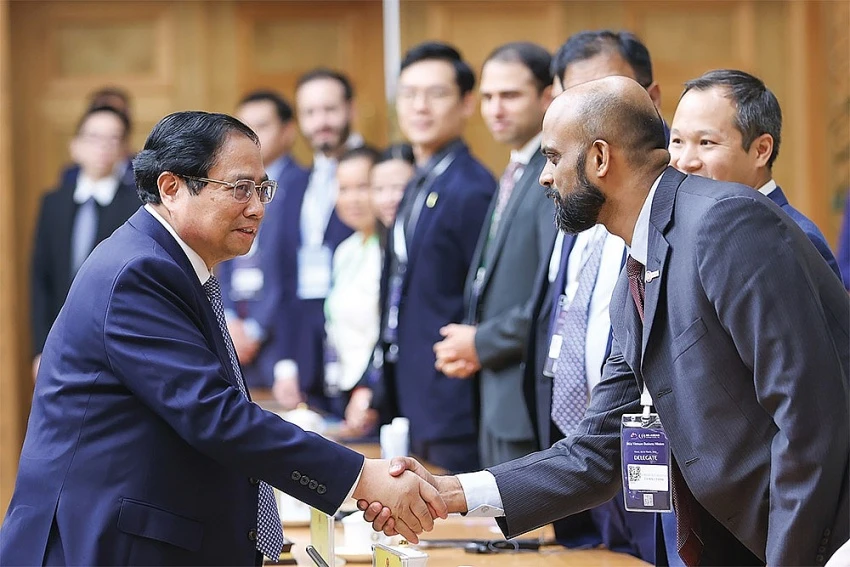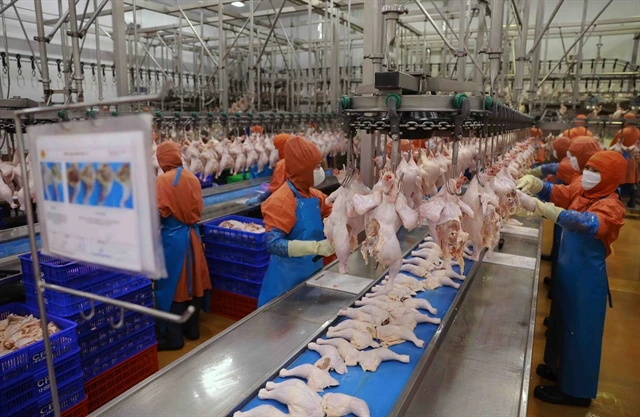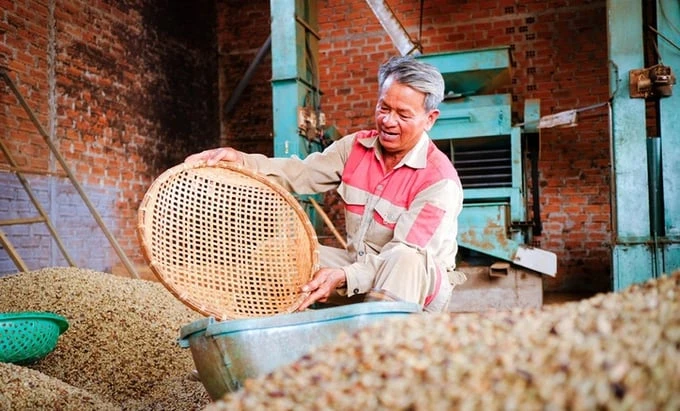
By Vietnam Expo On 28-03-2024 at 4:14 pm
Game-changing ESG initiatives expected
Hitoshi Honna, director and president of Erex Co., Ltd., was present at the Vietnam Business Forum (VBF) for the first time last week, with high expectations about his renewable energy projects here.
“I am impressed with the government’s net-zero commitments. We want to join and contribute to the country’s efforts to implement these ambitions,” he said.
Together with economic growth, local demands for electricity are growing. Meanwhile, for a decade the volume of fossil energy sources like coal and gas to serve power plants has been declining, Honna added. “To meet growing power generation demands, Vietnam has to import from abroad, thus leading to foreign currency waste and increases in the electricity price.”
Having a presence in Vietnam since 2021, Erex is proposing 18 green energy projects in cities and provinces nationwide in line with Power Development Plan VIII. In alignment with the previous iteration, the company is building a biomass power plant expected to be commercially operational by the end of 2024.
According to a March survey conducted by Decision Lab, foreign-invested enterprises (FIEs) in Vietnam are now trending towards green growth and sustainable development amid challenges in traditional sectors, especially in manufacturing and processing.
A business outlook score of 37.2 for the manufacturing sector suggests a less optimistic outlook for the manufacturing sector in comparison to other sectors. The industry is grappling with numerous difficulties, particularly in the face of a global decline in aggregate demand.
Environmental, social, and governance (ESG) criteria have now becomes a motivation among FIEs. Foreign businesses prioritise governance and environment in aligning their operations with ESG criteria. And in the trend, giants like Heineken, Coca-Cola, Bosch, and Intel are pioneers.
Coca-Cola plans to focus on several critical sustainability programmes in 2024: supporting nature-based solutions in the Mekong Delta, supporting a capacity-building programme to develop a financing roadmap for the circular economy in Vietnam, and looking at funding opportunities and analysis on re-use solutions and their enabling environment in Vietnam.
Claudia Chan, senior director for Public Policy at Coca-Cola ASEAN and South Pacific said, “Water is a priority for Coca-Cola because it is essential to life, our beverages, and the communities we serve. Our 2030 Water Security Strategy focuses on creating a water-secure future and accelerating efforts on collective action. This year, we have set up 39 systems for students and school communities to access clean water.”
“In the area of packaging, we are working to use more recycled content in our packaging, expand our use of refillable bottles, and collect packaging for recycling through our World Without Waste initiatives. We also partner to design new packaging solutions. We continue to apply innovative production models and technology in our 19-ha new greenfield bottling plant in Long An Industrial Zone, which will be fully operational in 2026,” Chan said.
Game-changing initiatives
Alexander Koch, managing director of HEINEKEN Vietnam, has a sustainability vision and ambitions in place. The company tracks its progress against its ambitions every year, and over the past 10 years since it started.
“To further reduce our environmental impact, we are also exploring bolder and more comprehensive renewable electricity solutions, such as direct power purchase agreements and solar energy systems,” he said. “We have the ambition of reaching net-zero in production by 2030, and across our value chain by 2040 – and we are in full support of the Vietnamese government’s agenda for net-zero by 2050.”
As demonstrated in the Decision Lab survey, approximately eight out of 10 businesses report to already have an ESG strategy developed, either by their global headquarters or locally. A promising indicator is that 34 per cent of businesses have already actively initiated local ESG strategies, with many others either in the monitoring or planning phase.
Moreover, 60 per cent of businesses have a board-level governance structure for sustainability and almost 60 per cent have defined ESG targets. And 60 per cent of businesses also indicated that they have budget allocated for such initiatives.
Specifically, 35 per cent of businesses responded that they have targets related to energy sourcing. About 25 per cent of businesses have targets to manage water and waste in Vietnam.
At the Vietnam Business Forum last week, Denzel Eades, vice chairman of British Chamber of Commerce Vietnam, said, “We applaud Vietnam’s dedication to net-zero emissions and sustainable development, as well as the government’s endeavours to champion this agenda. The UK private sector stands ready to contribute significantly across key sectors such as energy, finance, pharmaceuticals, and consumer goods.”
Similarly, Gabor Fluit, chairman of the European Chamber of Commerce in Vietnam said, “A central priority of our Green Growth Sector Committee is promoting green growth strategies, such as improving waste management, raising public awareness, and pioneering anti-plastic pollution solutions.”
Meanwhile, the Japanese Chamber of Commerce and Industry (JCCI) in Vietnam has established the AZEC/GX Promotion Working Group to cooperate with the Japanese government. With the participation of the Japanese embassy, Japan Bank for International Cooperation, and about 40 JCCI member companies from the Japanese side, they will promote specific projects and share best practices with related Vietnamese ministries and agencies in green innovation through decarbonisation technology, investment, and finance.
Game-changing ESG initiatives expected
According to the Decision Lab survey, a market-based mechanism is yet to make a positive impact on foreign businesses’ ESG initiatives in Vietnam. Establishing these mechanisms, as well as improving access to green finance, current infrastructure, and the maturity of supply chain components will greatly benefit foreign businesses’ implementation of environmental initiatives, the survey noted.
There are several factors impacting environment initiatives, including awareness of employees, financial capability, infrastructure, comprehensive and transparent regulations, access to green finance, and availability of market-based mechanisms.
Slightly over one-quarter of businesses express confidence in Vietnam’s commitment to sustainable and green development. Currently, more than half indicate that current strategies support only limited to moderate objective achievements. This suggests there may be a gap between expectations and progress. Businesses prioritise financial incentives and regulatory relief when seeking government support for their ESG efforts.

Author
Vietnam Expo
Related posts
18-07-2024
Pepper export turnover up over 30% in H1





